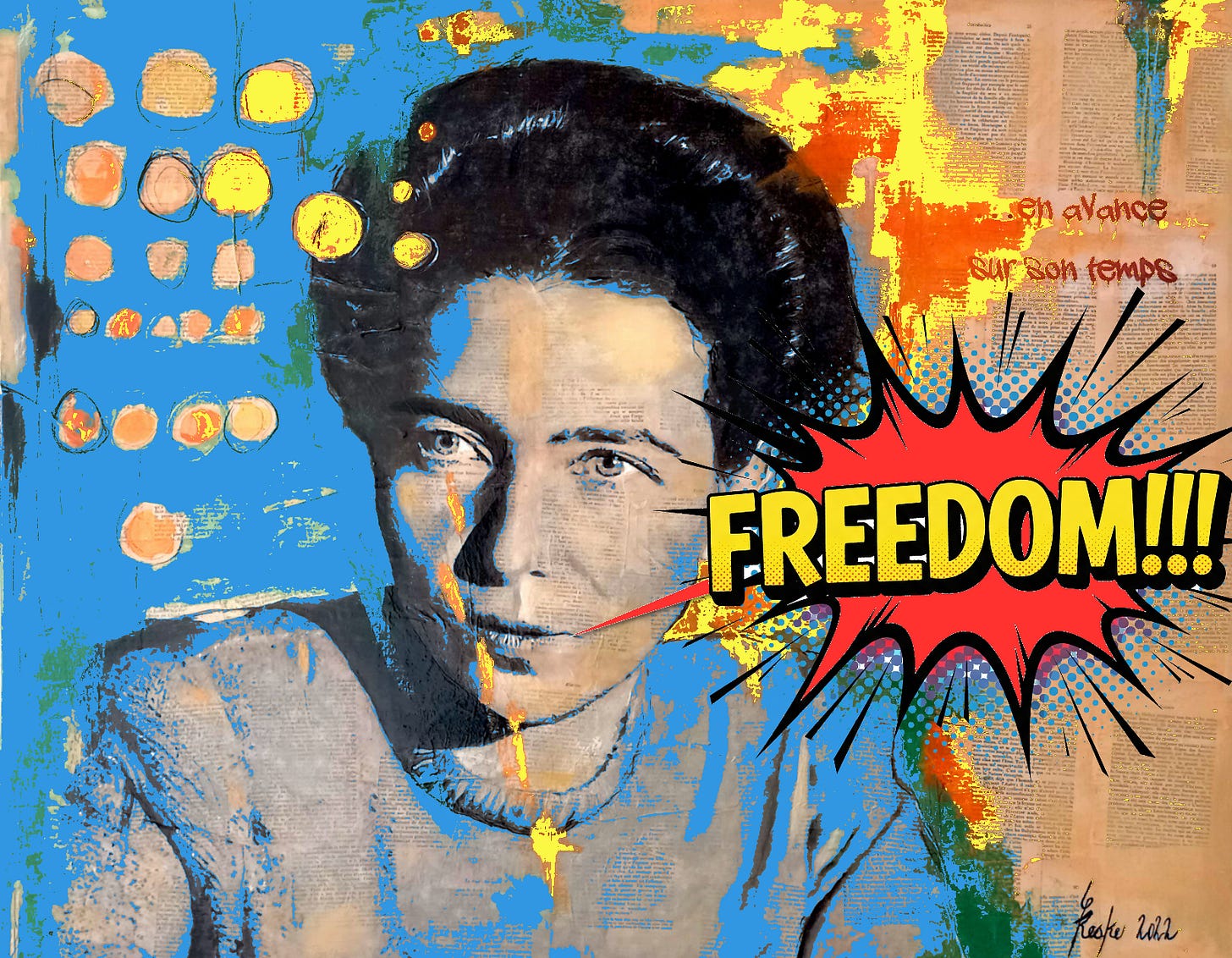Freedom Isn't Yours to Keep
The discourse this week around a certain “free speech advocate” and simply quoting, ya know, their speech has me ruminating on the nature of freedom.
Thankfully there are those who’ve come before me who’ve done some of this thinking already. To take a very reductionist view of her book The Ethics of Ambiguity, Simone de Beauvoir argues that her freedom has meaning only if others are free. Freedom is not a condition that can be bestowed upon an individual; freedom is a shared condition for us all.
When we see people being punished for exercising their freedom, that punishment not only diminishes their freedom, but also our own. But how do we recognize someone’s freedom being diminished?
This is a question that I think The Ledger gives us the tools to answer. In the same way we can evaluate our individual choices, words, and actions as good or harmful, we can use the same steps.
See people. Witness them for what they are, not what you assign them to be.
Use that witness for empathy. Use that witness to guide reason. What can I do?
Act.
Accept moral responsibility. Everything you do or choose not to do makes the world a little better, or a little worse. When we look at this through the lens of our society, this means understanding how quiet acceptance of what we see around us. Acknowledge your impact. Even inaction has a moral value.
Witness yourself. Understand your impact on the world around you. See yourself as part of it, not separate.
A tragic act of violence was committed last week. The response of people with power to enhance or reduce our freedoms has been towards the latter. Whether you think the responses to the event were sufficiently respectful or should be considered “hate speech”, we have all lost freedom this week.
But how do I know that?
I see people. People are grieving. People are scared. People are using both of those intense emotions to push their own agendas.
I can empathize with the grieving, and the scared.
For the grieving, it’s not only the loss of the person. They feel that the core of their beliefs, the ideals they shared with the lost, their very identity, is under attack. It’s terrifying. It makes you feel that your foundation is being torn from beneath your feet.
For the scared they are seeing their fears coming to pass. Before any detail was known about the person who committed the crime and why, the very pinnacles of power were promising retribution against those who they disagreed with. And since people have already lost their livelihoods for speaking against the approved narrative.
Grief. Fear. Both fuel anger.
Reason tells us that anger is a poor guide for making decisions. It encourages consequences that generate harm justified as retribution.
Accept Moral Responsibility. We live in society that is governed by the will of the people, no matter how much we defer to authority. That authority serves us. By the words of our very foundational legal document, which begins with “We the People”, our freedom is tied up with one another’s.
Witness yourself. This may be the hardest part. Does what I say matter? What I do? What I permit to be done?
Freedom, then, isn’t an abstraction. It is not mine to keep if it is denied to you. It isn’t safeguarded by speeches alone, nor is it lost only in dramatic acts of censorship or violence. It erodes in the silences we allow, the punishments we excuse, the grief and fear we let calcify into anger without reckoning.
Simone de Beauvoir gave us the what: freedom only has meaning when it is shared.
The Ledger gives us the how: a practice of witnessing, of acting with empathy and reason, of carrying responsibility for both what we do and what we fail to do.
So when violence strikes, when anger surges, when leaders rush to curtail what can be said or thought, the question isn’t just are we free? It’s how will we keep freedom alive for each other?
Because if I do not see you, if I do not defend your right to speak, to grieve, to dissent, even when I disagree with you, then my own freedom has already begun to collapse. And if you do not defend my freedom, then your freedom is at risk too.
If you're ready to explore practical philosophy for everyday ethical decisions, without the academic jargon, subscribe to Radical Kindness: Empathy as Rebellion. Every week, I share frameworks for navigating moral complexity, personal stories of growth through adversity, and tools for building a more ethical life.
Join a growing number of thoughtful readers who are figuring out how to be good humans in a complicated world.




This really struck me. I love how you weave together reason, empathy, and responsibility, it makes freedom feel less like an abstract ideal and more like a shared daily practice. The reminder that it erodes not only in grand acts but also in silences and small excuses is powerful. It left me reflecting on where I might be silent in ways that matter.